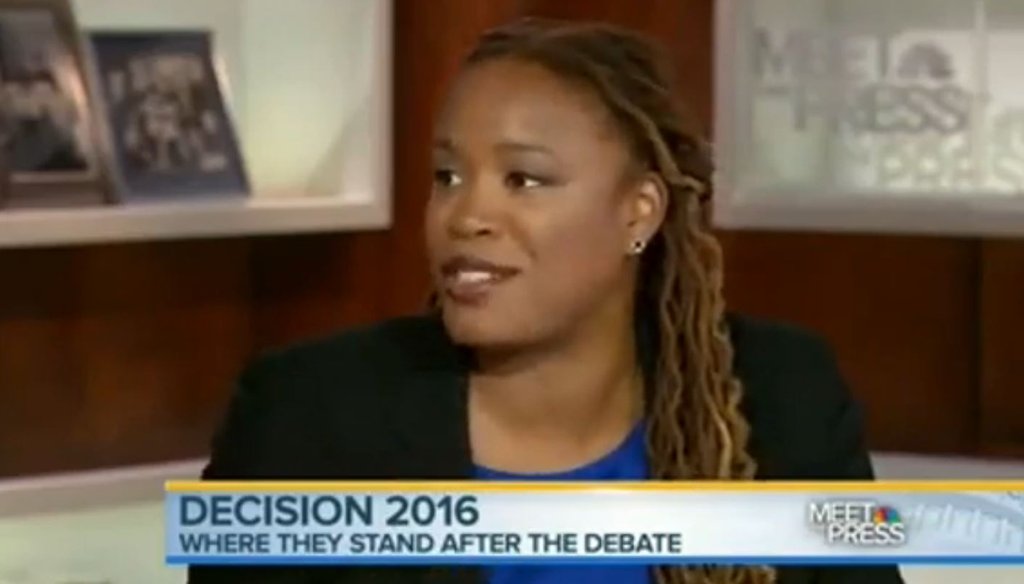Stand up for the facts!
Our only agenda is to publish the truth so you can be an informed participant in democracy.
We need your help.
I would like to contribute

Heather McGhee, a Democratic pundit and president of Demos, talks about the Republican Party's disconnect with women on Aug. 9, 2015, on "Meet the Press."
Republican presidential nominee hasn't won over women since 1988, says progressive pundit
Personal attacks against Fox News anchor Megyn Kelly may have cost Donald Trump an invite to an influential conservative powwow, but a prominent progressive activist says "batting away" the frontrunner’s misogyny will do little to help the GOP.
Heather McGhee, president of the liberal economic think tank Demos, said on Meet the Press that the Republican Party has both institutional and structural biases against women.
"I think it’s important to remember the Republican presidential nominee hasn’t won women since 1988, so this is a very deep problem for the party," McGhee said Aug. 9, 2015. "It’s not going to be enough for anyone, a commentator or one of the candidates, to just disavow Trump’s sort of interpersonal sexist comments."
We were curious about McGhee’s 1988 statistic. Is it true that no GOP nominee candidate in almost three decades has earned more support from women than the Democratic nominee?
McGhee pointed us to an article published Aug. 7, 2015, in the New York Times. Even though the article repeats the statistic without citing a source, we found several datasets that corroborate the claim with slightly different numbers.
Sign up for PolitiFact texts
To be clear, the source of the information is surveys of voters, and includes exit polling data, so it's not an official record. But the surveys are widely cited as the best data available.
In 1988, Republican nominee George H.W. Bush received a single percentage point more of female votes (at 50 percent) than Democratic presidential candidate Michael Dukakis, according to research by the Center for American Women and Politics at Rutgers University. Since then, no GOP candidate has "won" the women’s vote.
Women overall have had a higher voter turnout than men in every presidential election for 35 years, almost always favoring liberal candidates. Their allegiance to the Democratic party is reflected in congressional races as well.
Barack Obama earned 56 percent of women’s votes in 2008 — one of the highest shares of female voters ever — and 55 percent in 2012.
Why do more women vote for Democrats? Aside from more women simply identifying as Democrats than men, women are also more likely to favor left-leaning policies of more government assistance for poor Americans, children and the elderly; providing better access to contraceptives and reproductive health; and protecting the environment, according to the Pew Research Center.
Other factors include the rise of the powerful pro-choice PAC Emily’s List in the 1980s and 1990s and the controversy over Supreme Court nominee Clarence Thomas, added Karen O’Connor, a professor of political science at American University's Women & Politics Institute.
"Women were very angry," O’Connor said of the all-male Senate Judiciary Committee’s questioning of Thomas’ former employee, Anita Hill, who accused Thomas of sexual harassment.
The partisan gap has solidified in recent years, but experts say the female vote began to align with Democrats in 1980, eight years before Bush won a slight majority of female voters. Kelly Dittmar of Rutgers’ Center for American Women and Politics lists the feminist movement, increased participation in the labor force, and greater reliance on government programs as reasons for the shift. At the same time, men have shifted right, she said.
Women generally favored GOP candidates from the suffrage movement in 1919 through the 1950s. Republican President Herbert Hoover was known as "the woman's candidate" in 1928, according to feminist scholar Jo Freeman. Democratic presidential candidates lost the female vote by double digits in 1952 and 1956, according to Gallup data.
"Early on, white upper-class women were Republicans," explained O’Connor.
Then came the 1960s, with both parties responding to the feminist movement. The era of bipartisanship was reflected in the presidential elections, with Democrat Lyndon B. Johnson and Republican Richard Nixon each receiving substantial majorities of female votes.
Featured Fact-check
By the late 1970s, however, the political divide in women’s votes resurfaced and changed course. Christina Wolbrecht, a professor who studies gender and politics at the University of Notre Dame, points to a specific watershed moment: the 1980 Republican convention, when the party for the first time refused to endorse the Equal Rights Amendment.
"By the early 1980s, the two parties stood on opposing sides of the debate over women’s rights," Wolbrecht wrote in The Politics of Women’s Rights.
Not that the GOP wasn’t aware of the divide. In his first term as president, Ronald Reagan responded by enacting policies that appealed to women.
"Reagan supported things like tax credits for child care and individual retirement accounts for homemakers, and the White House Working Group for Women was created in 1983," said Dittmar of Rutgers. "He also appointed some women to high-profile posts (such as) Sandra Day O'Connor to the Supreme Court."
In his 1984 re-election, Reagan beat Walter Mondale and his female vice presidential pick with 56 percent of women supporting him.
The experts said women are more driven by party lines than female candidates, which will make it hard for Republicans to upend the trend in 2016.
Our rating
McGhee said, "The Republican presidential nominee hasn’t won women since 1988."
The data, based on surveys of voters, backs her up. George H.W. Bush won his 1988 election campaign with just 1 percentage point more of female votes than his Democratic opponent. No Republican has "won" the fight for more women’s votes since.
We rate McGhee’s claim True.
Our Sources
Twitter exchange with Heather McGhee, Aug. 9, 2015
Email interview with Kelly Dittmar, professor of political science and scholar at the Center for American Women and Politics at Rutgers University, Aug. 9, 2015
Email interview with Karen O’Connor, professor of political science at American University's Women & Politics Institute, Aug. 9, 2015
Media Matters, ‘On NBC, Demos' Heather McGhee Highlights How The GOP's "Deeper Problem" With Women Is More Than Just Trump's Sexist Comments,’ Aug. 9, 2015
New York Times, ‘Fear That Debate Could Hurt G.O.P. in Women’s Eyes,’ Aug. 7, 2015
New York Times, ‘ ‘Gender Gap' Near Historic Highs,’ Oct. 21, 2012
Rutgers University, ‘The Gender Gap,’ July 15, 2014
Rutgers University, ‘Gender Differences in Voter Turnout,’ May 2014
University of Virginia Center for Politics, ‘Mind the Gap,’ Sept. 12, 2013
Pew Research Center, ‘The Gender Gap: Three Decades Old, as Wide as Ever,’ March 29, 2012
Jo Freeman, ‘Gender Gaps in Presidential Elections,’ June 1999
Christina Wolbrecht, The Politics of Women's Rights, 2000
Browse the Truth-O-Meter
More by Linda Qiu
Republican presidential nominee hasn't won over women since 1988, says progressive pundit
Support independent fact-checking.
Become a member!
In a world of wild talk and fake news, help us stand up for the facts.




















































